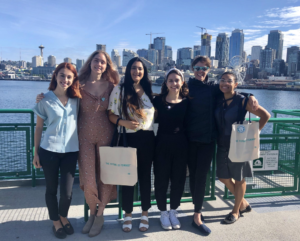
Name: Eleni Sakellakis
Major(s)/Minor(s): Public Health and Political Science with a minor in Gender and Sexuality Studies
Career Interest: Undecided. Possibly law.
Conference you attended: Feminist Camp Seattle
Describe yourself and why you wanted to attend the Feminist Camp:
During my time as a student at Tulane, my dedication to feminism has always been reflected in my academic endeavors. I have continuously taken classes and involved myself in extracurricular activities that involve feminism, women’s issues, and social justice in general. Because I will be graduating next spring, I was looking for a way to get some ideas about how to translate my feminist belief into a career path or into my lifestyle once I’m no longer a student. Feminist Camp seemed like a helpful way to learn how to bring my passion for social justice out of the classroom and into my real life.
Highlight information you learned on reproductive health and reproductive justice:
Reproductive justice was an overarching theme of the conference. We visited a variety of organizations focused primarily on reproductive justice. First, we spent a day at Planned Parenthood of the Great Northwest and Hawaiian Islands, where we learned about the structure and function of Planned Parenthood Affiliates—including the difference between PP Federation of America, the healthcare organization, and PP Action Fund, their political organization. We also learned about how equity and inclusion is incorporated into Planned Parenthood’s work. Later in the week, we visited NARAL Pro-Choice Washington, an organization that is solely dedicated to reproductive justice advocacy. There, we learned what the fight for reproductive rights looks like in states like Washington which have a pro-choice legacy and are on the forefront of progress. For these states, advocacy stretches far beyond simply protecting the right to abortion, and addresses the unique needs of particular groups, such as immigrants, transgender individuals, incarcerated people, and low-income individuals.
Describe your favorite parts of the conference:
One part of the conference that I thought was especially thought provoking and helpful was the transmisogyny workshop we attended at Planned Parenthood. Although I have learned about these issues before, I have never had the opportunity to learn about transmisogyny and transphobia in depth, in an educational setting. I think this workshop was particularly relevant because what we learned can impact our behavior and interactions with other people regardless of what field we are in.
Detail what you learned that you hope to never forget:
One particularly important aspect of the conference was how we got to see what feminism looks like in a variety of fields and from a variety of perspectives. I never anticipated visiting a huge corporation like Starbucks during a conference dedicated to social justice, but doing so gave me new insight into what activism can look like in different fields. We also visited several small businesses, from restaurants to jewelry shops to photography studios, and learned how the owners of those businesses encapsulate feminism into their work. I hope I always remember that I can bring my feminist values to any setting I find myself in.
Why should other students attend a Feminist Camp:
Feminist Camp is a great experience for anyone who wants to get ideas about career options, social justice activism, or advice about life in general. The workshops we attended presented many examples of how feminist beliefs and a passion for social justice can be translated into a person’s every day life and career. Besides the breadth of information given during the conference, another valuable aspect of Feminist Camp is the environment created by being surrounded by cool, like-minded people who are committed to learning about social justice.
How did this experience help with your future ambitions?
Although I hoped to come out of Feminist Camp with a clearer idea about what career path to pursue, I left confused, with more options than ever. However, this was definitely for the best, and the experience has also taught me that I can broaden my view and that I don’t need to limit my interests. Many of the individuals and organizations we visited incorporated feminist values into their work, but not in the traditional ways I expected. This helped show me that no matter what career path I take, I will be able to find a way to bring feminism to what I do. Feminist Camp also gave me a lot of information that I can use to evaluate what areas of feminism are most important to me and how I want to incorporate those interests into my life going further.
